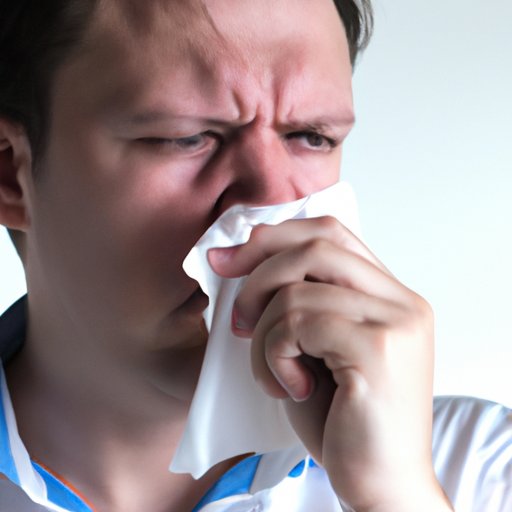
Introduction
An allergy is an immune system reaction to a substance that is typically harmless to others. Common allergens include pollen, pet dander, dust mites, certain foods, and medications. When a person with an allergy comes into contact with these substances, their immune system overreacts, causing a range of symptoms such as a runny nose, itchy eyes, hives, or difficulty breathing.
Causes of Adult-Onset Allergies
It is not uncommon for people to develop allergies later in life, even if they did not have them as children. Several factors can contribute to the onset of adult allergies. Genetics may play a role, making someone more susceptible to allergies. Also, environmental factors such as living in certain environments, exposure to pollution, and a high-stress lifestyle can increase the likelihood of developing allergies.
Changes in the immune system can also trigger adult-onset allergies. As we age, our immune system changes, making it more susceptible to allergies. Even people who have had allergies in the past may find themselves allergic to new allergens, and allergies that were not severe in the past may become more severe later in life.
People who smoke and those who have never been exposed to certain allergens may also be more at risk for adult-onset allergies. Some researchers also suggest that our bodies are becoming more sensitive as a result of the immunization processes.
Common Culprits of Adult Allergies
Adult-onset allergies can be caused by a host of factors, including environmental allergens, specific foods, or medications.
Pollen is a common environmental allergen that causes hay fever, a condition that affects millions of people worldwide. Mold and dust mites can also cause allergies, leading to respiratory problems and skin irritations.
In addition, animal dander can cause allergies in some people, particularly if pets are inside your home or office. Other allergens that some people may develop allergies to later in life include specific food categories, perfumes and fragrances.
Symptoms of Adult-Onset Allergies
The symptoms of adult-onset allergies can vary depending on the allergen type and the severity of the reaction. Typical symptoms of adult allergies include congestion, sneezing, and itchiness of the skin, eyes, and nose. People may also experience trouble breathing or gastrointestinal issues like diarrhea. Symptoms typically manifest within a matter of minutes or hours after exposure to the allergen.
In severe cases, including anaphylaxis, an allergic reaction can cause swelling, trouble breathing, decreased heart rate, and a rapid decrease in blood pressure, all of which can be fatal.
Diagnosis and Treatment
To gain proper diagnosis for adult-onset allergies, specialists may require a physical examination, medical history, and a series of diagnostic tests. Skin prick tests or blood tests may reveal that a person is allergic to specific allergens. Once the allergen and type of allergy have been identified, treatment options may then begin.
Avoidance of allergens is often recommended as a first step in managing allergies. Over-the-counter allergy medications, such as nasal sprays, eye drops, and antihistamines, can also be used to relieve symptoms. Severe cases may require prescription medications like allergy shots, corticosteroids, or immunomodulators.
Coping with Adult Allergies
Coping with adult allergies can be challenging, particularly if symptoms are severe. It can also be emotional draining to deal with allergies every single day. People with allergies are advised to find ways to reduce exposure to allergens, such as using air purifiers or wearing a mask in environments with increased allergens.
It is important to take note of one’s emotional well-being because long-term exposure to stress can affect the severity of allergies. Seeking therapy or alternative stress-reducing methods has been helpful for many people dealing with allergies.
Prevention Tips for Allergies
Adult allergies prevention involves taking steps to reduce exposure to allergens. People who are prone to allergies should avoid exposure to known triggers, including dust, mold, and animal dander. Proper cleaning and air ventilation can reduce exposure to these allergens.
Additionally, people can work to boost their immune systems by embracing healthier lifestyles that encourage a healthy diet and physical exercise. People should avoid smoking, as it could increase the risk of allergies.
Conclusion
In conclusion, adult-onset allergies are a common condition that affects many people worldwide. Recognizing the causes and triggers of allergies can help people identify potential allergens and take steps to manage symptoms. Seeking treatment from a qualified professional is also advised, as they can provide the necessary steps for managing daily activities and offer appropriate medications.
By maintaining a healthy lifestyle and taking steps to reduce exposure to allergens, people with allergies can improve their quality of life and take control of their condition. Remember, access to professional counseling is always given to enable people to manage allergies and continue with their daily activities with minimal struggle.





